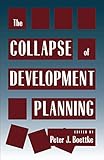Collapse of Development Planning / Peter J. Boettke.
Material type: TextSeries: Political Economy of Austrian School ; 2Publisher: New York, NY : New York University Press, [1994]Copyright date: ©1994Description: 1 online resourceContent type:
TextSeries: Political Economy of Austrian School ; 2Publisher: New York, NY : New York University Press, [1994]Copyright date: ©1994Description: 1 online resourceContent type: - 9780814712160
- 9780814723456
- 338.9
- HD75.C645
- online - DeGruyter
| Item type | Current library | Call number | URL | Status | Notes | Barcode | |
|---|---|---|---|---|---|---|---|
 eBook
eBook
|
Biblioteca "Angelicum" Pont. Univ. S.Tommaso d'Aquino Nuvola online | online - DeGruyter (Browse shelf(Opens below)) | Online access | Not for loan (Accesso limitato) | Accesso per gli utenti autorizzati / Access for authorized users | (dgr)9780814723456 |
Frontmatter -- THE POLITICAL ECONOMY OF THE AUSTRIAN SCHOOL Series -- Contents -- Acknowledgments -- 1. Introduction -- 1. Theory -- 2. Money and Capital in Economic Development -- 3. The Theory of Economic Development and the "European Miracle'' -- II. Case Studies of Planning -- 4. The Political Economy of Development in Communist China: China and the Market -- 5. The Failure of Development Planning in India -- 6. The Failure of Development Planning in Africa -- III. The Record on Foreign Aid and Advice -- 7. The World Bank and the IMF: Misbegotten Sisters -- 8. Does Eastern Europe Need a New (Marshall) Plan? -- IV. The Political Economy of the Asian Miracle -- IV. The Political Economy of the Asian Miracle 229 9. Industrial Policy as the Engine of Economic Growth in South Korea: Myth and Reality -- 10. The Political Economy of Post-World War II Japanese Development: A Rent-Seeking Perspective -- V. Market Solutions to Economic Development -- 11. Privatization and Development: The Case of Sri Lanka -- 12. Financial Reform and Economic Development: The Currency Board System for Eastern Europe -- Contributors -- Index
restricted access online access with authorization star
http://purl.org/coar/access_right/c_16ec
Conventional wisdom has it that government management of the economy is the means to transform a backward economy into a dynamic, modern one. Yet, after decades of international aid programs, development planning is today largely perceived as a failure paralyzed by its own bureaucracy and inefficiency. Despite billions of dollars of investment, development successes are few and far between and waste and mismanagement abounds. This book showcases a diverse range of development experiences in order to ascertain the reasons for this quagmire. Case studies of development planning in China, India, post-WWII Japan, South Korea, Africa, and Eastern Europe, and of foreign aid programs (including the Marshall Plan) illustrate the insights an Austrian approach provides toward an understanding of the failure of government development planning. While economists working within the Austrian tradition have previously addressed development issues, this volume represents the first full-length treatment of the subject from a modern market process perspective. Exploding the hegemony of the traditional development paradigm, The Collapse of Development Planning addresses one of the most pressing issues of international political economy. Contributing to the volume are: George Ayittey (American University), Wayne T. Brough (Citizens for a Sound Economy, Washington, DC), Young Back Choi (St. John's University), Steven Hanke (Johns Hopkins University), Steve Horwitz (St. Lawrence University), Shyam J. Kamath (California State University, Hayward), Shigeto Naka (Hiroshima City University), David Osterfeld (St. Joseph's College), Manisha Perera (University of Northern Colorado), Jan S. Prybyla (Pennsylvania State University), Ralph Raico (State University College, Buffalo), Parth Shah (University of Michigan, Dearborn), Kurt Schuller (Johns Hopkins University), Kiyokazu Tanaka (Sophia University, Tokyo), and Mark Thorton (Auburn University).
Mode of access: Internet via World Wide Web.
In English.
Description based on online resource; title from PDF title page (publisher's Web site, viewed 06. Mrz 2024)


